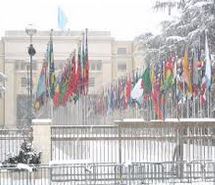Trade Balance of Developing and Developed Countries Continues to Converge, UNCTAD Statistics Show
UNCTAD Handbook of Statistics 2014 shows that developing and transition economies run large trade surpluses for merchandise and services trade.

Geneva: UN
Geneva, 9 December 2014 – Developing economies ran a combined merchandise and services trade surplus for 2013 of $177.6 billion, the UNCTAD Handbook of Statistics 2014 [1] reveals, representing a fall of 40 per cent as measured in current prices compared with 2012 and 63 per cent compared with the peak in 2007. Transition economies also ran a trade surplus in 2013 of $128.6 billion. This represented a fall compared with the previous year (21 per cent) and with the peak in 2011 (33 per cent). Developed economies ran a trade deficit of $65.3 billion in 2013, down from almost $400 billion the previous year; a reduction of 84 per cent (current prices).
This overall convergence is being driven by a convergence in merchandise trade. However, trade balances for services of developing and developed countries continue to diverge. As trade in services is becoming more important, it suggests that the overall convergence may not continue indefinitely.

Chart 1: Merchandise and total trade balance 1996–2013.
(Billion dollars and current prices). Source: UNCTADStat
Trade balances varied significantly at the regional level. The overall trade surplus for developing countries was driven by Asia, which operated a surplus of $403.8 billion in 2013. In contrast, developing countries in Africa and the Americas ran aggregate trade deficits of $100.4 billion and $114.8 billion, respectively. Developed countries in Europe ran an overall trade surplus of $630 billion, whereas developed countries in the Americas and Asia ran deficits of $566.4 billion and $130.1 billion, respectively.
The direction of trade balances also varied markedly between merchandise and services trade. In 2013 there was a continuation of patterns seen in previous years in which developing and transition countries ran a trade surplus for merchandise trade ($451.9 billion and $187.2 billion, respectively), while developed countries ran a deficit of $619.2 billion. For trade in services, the opposite was true: developing and transition countries ran trade deficits ($274.3 billion and $58.6 billion, respectively), while developed countries operated a surplus of $553.9 billion. Separating merchandise and trade in services also illustrates that the convergence in overall trade balances between developing and developed countries evident in recent years is being driven by merchandise trade. The opposite is true for services, where the trade imbalance continues to grow.

Chart 2: Merchandise and services trade balance 1996–2013.
(Billion dollars and current prices). Source: UNCTADStat.
The UNCTAD Handbook of Statistics 2014 also shows that total world exports in 2013 were valued at $23.6 trillion (up almost 3 per cent from 2012), of which merchandise trade accounted for 80 per cent ($18.8 trillion).
Along with providing detailed statistics on international merchandise and services trade, the 2014 edition also provides investment, commodity prices, maritime transport and other economic and social data, for all individual economies for which data are available. In addition, it includes figures for geographical regions, various economic groupings and world totals. The Handbook aims each year to provide data for the analysis and evaluation of world trade, investment, international financial flows and development. To the extent possible, UNCTAD provides estimates to fill in data gaps in order to furnish the most complete data sets.
The Handbook is available in printed form and on DVD. In addition, the data underlying the findings of the Handbook are available online at UNCTADStat (http://unctadstat.unctad.org), a continuously updated statistical database.
References
[1] The Handbook (Sales No. B.14.II.D.6, ISBN: 978-92-1-012077-7) may be obtained from the United Nations Publications Sales and Marketing Office at the address mentioned below or from United Nations sales agents throughout the world. Customers may send orders or inquiries to: United Nations Publications Sales and Marketing Office, 300 E 42nd Street,
9th Floor, IN-919J New York, NY 10017, United States of America. Tel: 1 212 963 8302, fax: +1 212 963 3489, e-mail: [email protected], https://unp.un.org.
Copyright © 2014 United Nations Conference on Trade and Development (UNCTAD), All rights reserved.
Email: [email protected]
Telephone: +41 22 917 58 28 or +41 79 502 43 11
You may have an interest in also reading…
Fifteen Reasons Why the Saudi Vision 2030 Plan Will Succeed
This writer is reflecting on some wonderful impressions gained – in early December 2019 – during a one-week intensive tour
Mario Draghi: Bond Buying a Success but Deflation Threat Remains
According to European Central Bank (ECB) president, Mario Draghi (speaking at a news conference on Wednesday 15th April) the Euros
Containers on Rail: China’s Next Big Opportunity in Supply-Chain Logistics
The transportation of containers by rail could grow substantially in China, especially if the nation continues adopting the kind of
















































































